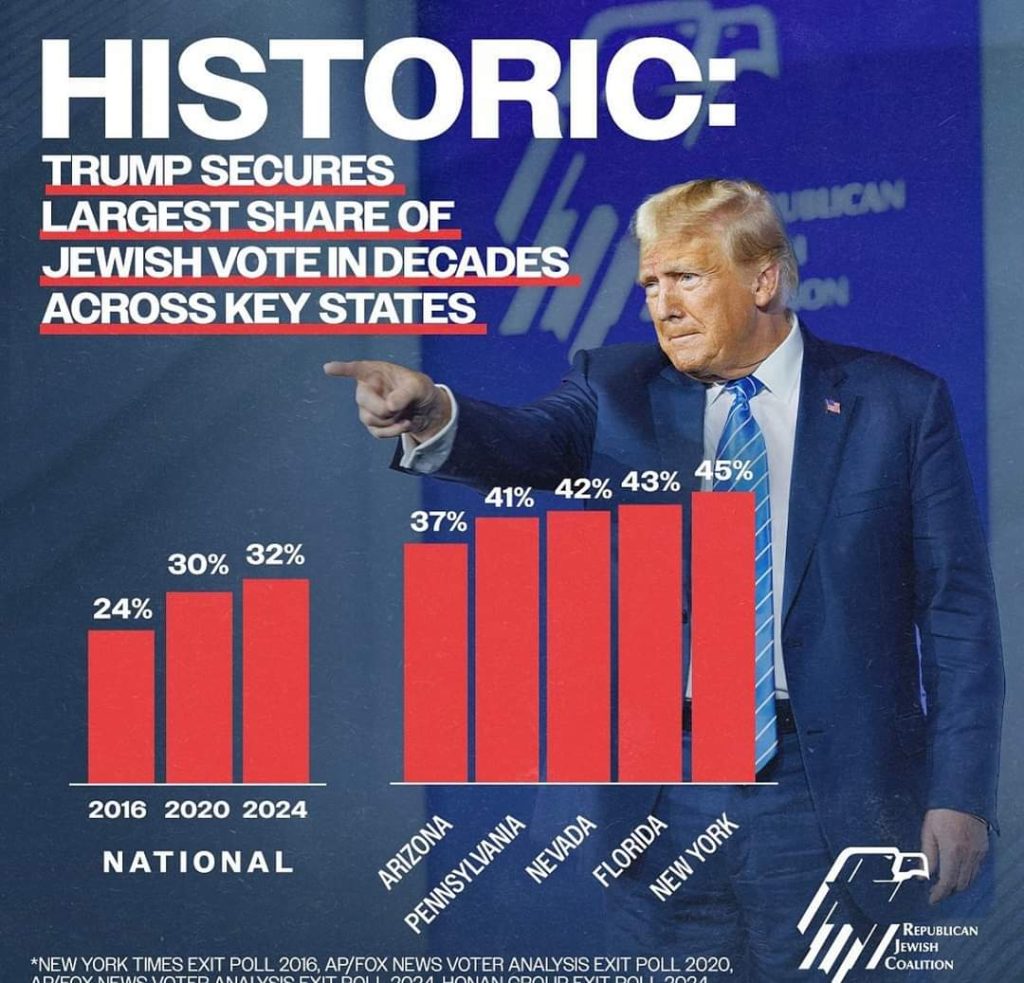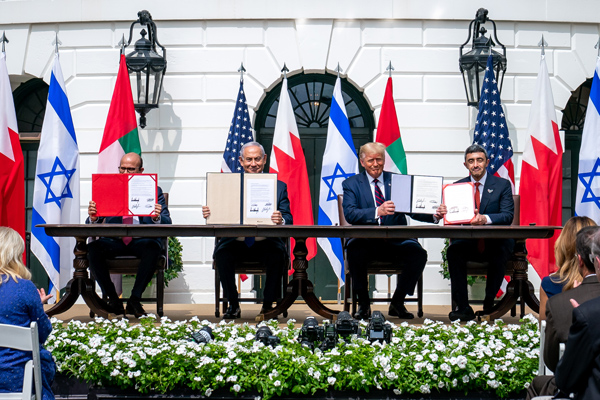
In a historic 2024 presidential election, Donald Trump secured broad support across diverse religious communities, including a record level of Jewish votes. Trump’s popularity within religious groups has been attributed to his diplomatic achievements, notably the Abraham Accords, his efforts toward peace in the Middle East, and his focus on avoiding military conflicts during his previous term.
The Republican Jewish Coalition (RJC) is celebrating President-elect Donald Trump’s vote share among Jewish voters in the 2024 election because they believe it is “the highest number of any Republican presidential candidate since 1988.”
The RJC’s CEO Matt Brooks and its national chairman, former Senator Norm Coleman, issued a statement congratulating President-elect Donald Trump over 30 minutes before he took the stage in Palm Beach to declare victory over Democratic Vice President Kamala Harris.
“President Donald Trump’s decisive victory tonight represents a triumph for American strength, leadership, prosperity, and the American dream,” Brooks and Coleman stated.
The RJC expressed pride in being part of this successful coalition, emphasizing its significant role in supporting Trump’s victory, especially in critical battleground states. The organization reported raising and spending over $15 million in support of President-elect Trump, driving Jewish voter turnout through an unprecedented paid media campaign and grassroots mobilization, with thousands of volunteers working in key Jewish communities across the nation.
Historic Jewish Support and the Abraham Accords’ Legacy
Jewish voters demonstrated an unprecedented level of support for Trump in this election, with polling data showing a significant uptick in votes compared to previous years. A key factor in this shift has been Trump’s role in fostering the Abraham Accords during his first term in office, a landmark agreement that established normalization of relations between Israel and several Arab nations, including the United Arab Emirates and Bahrain.

The Abraham Accords were hailed by Jewish leaders and communities as a step toward a more stable Middle East. Trump’s role in facilitating these agreements left a lasting impression among Jewish Americans, who viewed the peace-building initiative as a testament to his commitment to Israel’s security and regional harmony. For many, these diplomatic efforts strengthened Trump’s credibility as a leader who could promote stability in a historically volatile region.
Political analysts have also noted that Trump’s non-interventionist approach during his previous administration, where he prioritized diplomatic solutions over direct military involvement, appealed to Jewish voters concerned about America’s involvement in foreign conflicts.
Support from Other Religious Communities
Trump’s appeal extended beyond the Jewish community, with strong support from other religious groups who appreciated his stance on religious freedom, family values, and moral issues central to their beliefs. Evangelical Christians, who have historically been among Trump’s staunch supporters, continued their strong backing in the 2024 election, citing his alignment with their conservative values and commitment to religious freedom in America.
Catholic voters also gravitated towards Trump, appreciating his administration’s prior focus on family-oriented policies and his Supreme Court appointments, which have had long-term implications for issues such as religious liberty. Many viewed Trump as a defender of their faith in an increasingly secularized society, emphasizing his commitment to uphold traditional values and safeguard freedom of religion.
Trump’s “Peace through Strength” Approach Resonates
Trump’s “peace through strength” philosophy, focusing on strong national defense coupled with restraint in foreign conflicts, resonated across religious communities wary of ongoing military entanglements. His administration’s withdrawal from protracted conflicts was seen as a testament to his intent to prioritize peace while maintaining a strong national defense.
Trump’s historic support from religious voters in the 2024 election reflects the impact of his first-term foreign policies and his dedication to issues central to various faith communities. His ability to draw Jewish votes to an unprecedented level, coupled with continued support from Christian communities, highlights his resonance with voters who value peace, religious freedom, and stability. This broad religious backing, buoyed by the Abraham Accords and his non-interventionist legacy, was a defining factor in Trump’s path to victory.